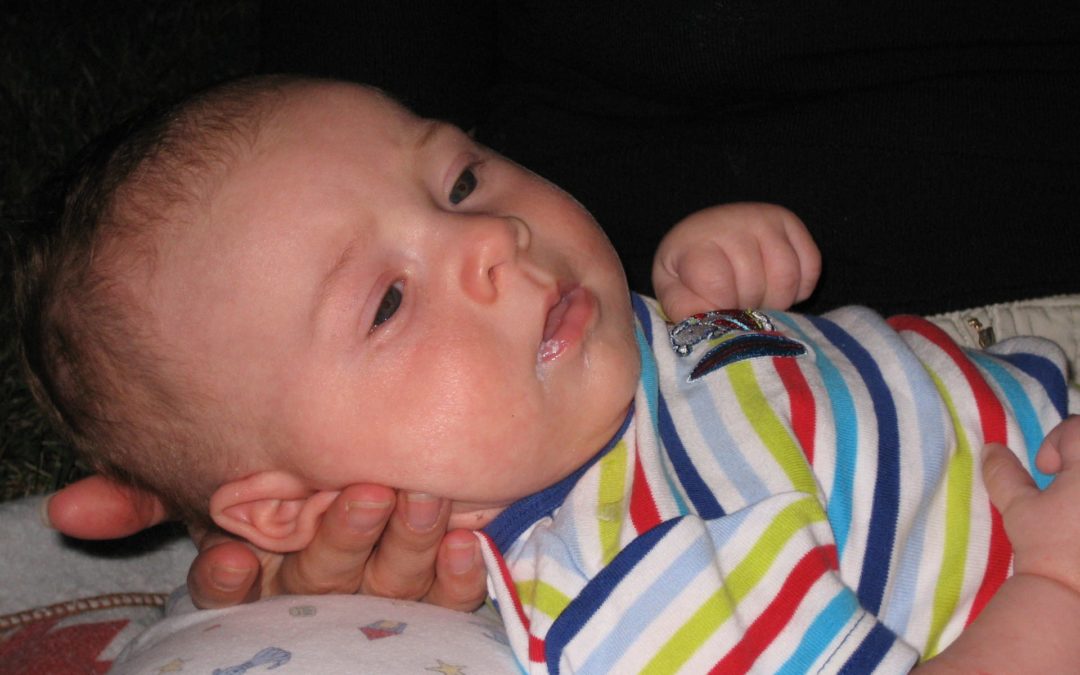By Dr. Kurt Klinepeter, Brenner Children’s Hospital
Developmental and Behavioral Pediatrician
Many parents worry at some point whether their child is developing normally and when they should be concerned about sitting up, walking, talking and interacting with others. It is commonly stated that children, and particularly siblings, should not be compared to each other. However, because children’s developmental skills develop in an orderly and predictable manner, it is quite possible and appropriate to compare children to the skill set they should have at any age and to be aware of developmental “red flags”.
Gross or large motor skills are the primary developmental skills in the first 12-18 months of life. Even newborn infants should demonstrate some head control. The 5-6 month old is holding his or her head up, popping up on his or her arms in prone position, and starting to sit with support. By 8-10 months of age, infants should be sitting independently and developing mobility (scooting, crawling). They are usually pulling up by at least 12 months of age and walking with, and then without, support a few months afterwards. Muscle tightness, weakness, or any unusual movements are a developmental red flag. The rate of motor progress can vary, but the key is steady progress over time.
Infants develop reaching, grasping, and transferring skills by 8-10 months of age. Most are able to self feed by 12 months of age with further refinement of self-help skills thereafter. Most 2 years-olds help with dressing and bathing. The range of toilet training is 2 to 4 years of age. Toddlers know what to do with a crayon — making a stroke by 2.5 years-old and a circle by 3 years-old. True handedness is not usually apparent until 3 years of age. Early handedness (right or left), particularly in the first year of life is a developmental red flag.
Babies are social and demonstrate responsiveness to others by 6-8 weeks of age. Their eyes track together by 3 months of age and they are able to localize to voice or environmental sounds by 8-10 months of age. Any failure to respond to visual stimuli by 3-6 months of age or auditory stimuli by 8-12 months of age is a developmental red flag.
Young babies produce vowel sounds and then babble (consonant-vowel sounds) beginning at 6-8 months of age. Failure to babble by 12 months of age is a concern. Single words occur at least by 12-18 months of age. Thereafter, speech/language development literally explodes. Typical two year-olds have a multiword vocabulary and are putting words together. No expressive language by 2 years of age is a developmental red flag. Even limited language should be noted by 2 years of age and closely tracked since speech/language delays are the most common developmental disorder in young children. Children should be talking in complete and lengthy sentences by 3 years of age and in paragraphs with the ability to relate a story by 4 years of age. Speech sound development is not complete until 6-7 years of age. This means that young children predictably mispronounce certain speech sounds. By 3 years of age, approximately 75% of speech production should be understood in a typically developing child. If you find that you are still “interpreting” for your child after that point, a speech/language evaluation may be needed.
Children will look at something that is pointed out to them by 15-18 months of age. Failure to seek, share, and be motivated by social interaction (wanting mom and dad’s attention) after 18 months of age is a developmental red flag.
The bottom line is that children grow and progress in a steady fashion within age appropriate ranges. Any loss of developmental skills at any age is a developmental red flag. Trust your instincts. As a parent you can best serve your child by fostering a good relationship with your child’s pediatrician or health care professional and discuss any questions or concerns that you have at your child’s well-check visits. Development is easily screened in the primary care office and, if necessary, you and the provider can discuss whether a referral for assessment is indicated. Developmental disorders occur frequently and it is well known that the key to the best possible outcome is to identify and treat as early as possible.
Brenner Children’s Hospital houses the only medical and developmental evaluation clinic in the region for developmental delays and disabilities. For more information, call 336-716-2255.
















